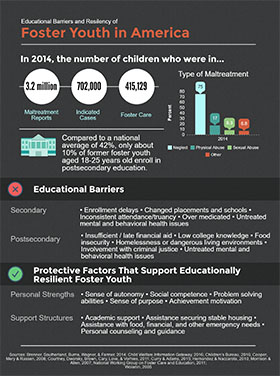Researchers have painted a stark picture of the lives of former foster youth as they transition into adulthood. Former foster youth face notable barriers in transitioning to adulthood, including financial hardships, exposure to dangerous environments, and untreated mental health issues. Specifically, former foster youth have high rates of homelessness, food insecurity, and joblessness, as well as lower income rates (Courtney, Dworsky, Brown, Cary, Love, & Vorhies, 2011; Curry & Abrams, 2015). They are also far more likely to live in and be exposed to dangerous environments where they are exposed to violence, drugs, and other illegal activities (Curry & Abrams, 2015; Courtney et al., 2011). Compounding these challenges, there is a precipitous drop in mental health service utilization, a 60% drop, during the first year after foster youth age out of the child welfare system (Jones, 2014; McMillen & Raghavan, 2009). In light of the challenges faced both in primary and secondary education, and in transitioning into adulthood, it can be anticipated that postsecondary outcomes for former foster youth are equally stark. And they are. In fact, only about 10% of former foster youth attend postsecondary education, and those who do attend postsecondary education are half as likely as their peers to complete their studies (Davis, 2006; Wolanin, 2005).
With a growing awareness of the barriers and outcomes faced by former foster youth, a variety of stakeholders, including the federal and state governments, researchers, community-based organizations, universities, and colleges, have supported the development of policies, programs, and practices designed to support former foster youth (Fried, 2008; Sarubbi, Parker, & Sponsler, 2016). Interventions designed to promote resilience processes among foster youth have been shown to empower foster youth with new behavioral models and increase access to important support structures (Leve, et al., 2012; Morton, 2016; Morrison & Allen, 2007). Research on initiatives aimed at improving postsecondary outcomes by building resiliency among former foster youth has also shown positive outcomes (Geenen, Powers, & Phillips, 2015; Hernandez & Naccarato, 2010; Kirk & Day, 2010). Likewise, federal and state policies providing an extension of care and financial aid support for former foster youth attending postsecondary education have increased both postsecondary enrollment and supports offered to former foster youth (Sarubbi et al., 2016). However, while initial research on many of these policies, programs, and practices has shown positive impacts, the scale of these changes is such that they reach only a minute fraction of former foster youth; there is still substantial knowledge needed to test and expand these interventions at scale (Hernandez & Naccarato, 2010; Kirk & Day, 2011; Sarubbi et al., 2016).
OCCRL’s newest FEATURE on Research and Leadership brief, Reality and Resiliency: The Educational Needs and Strengths of Former Foster Youth, provides an overview of educational outcomes of former foster youth; outlines the importance of building policies, programs, and practices that support resiliency among former foster youth; and provides areas for future research necessary to expand current initiatives to scale.
References
- Courtney, M. E., Dworsky, A., Brown, A., Cary, A., Love, K., & Vorhies, V. (2011). Midwest evaluation of the adult functioning of former foster youth: Outcomes at age 26. Chicago, IL: Chapin Hall, University of Chicago.
- Curry, S. R., & Abrams, L. S. (2015). Housing and social support for youth aging out of foster care: State of the research literature and directions for future inquiry. Child and Adolescent Social Work Journal, 32, 143-153. doi. 10.1007/s10560-014-0346-4
- Davis, R. J. (2006). College access, financial aid, and college success for undergraduates from foster care. Washington, DC: National Association of Student Financial Aid Administrators.
- Fried, T. (February/March, 2008). Community colleges step up to support foster care students. Community College Journal, 78(4), 38-39.
- Geenen, S., Powers, L. E., & Phillips, L. A. (2015). Better futures: A randomized field test of a model for supporting young people in foster care with mental health challenges to participate in higher education. The Journal of Behavioral Health Services and Research, 42(2), 150-171. doi: 10.1007/s11414-014-9451-6
- Hernandez, L., & Naccarato, T. (2010). Scholarships and supports available to foster care alumni: A study of 12 programs across the US. Children and Youth Services Review, 32, 758-768. doi. 10.1016/j.childyouth.2010.01.014
- Jones, L. (2014). Health care access, utilization, and problems in a sample of former foster children: A longitudinal investigation. Journal of Evidence-Based Social Work, 11, 275-290. doi: 10.1080/15433714.2012.760993
- Kirk, R., & Day, A. (2011). Increasing college access for youth aging out of foster care: Evaluation of a summer camp program for foster youth transitioning from high school to college. Children and Youth Services Review, 33, 1173-1180. doi: 10.1016/j.childyouth.2011.02.018
- Leve, L. D., Harold, G. T., Chamberlain, P., Landsverk, J. A., Fisher, P. A., & Vostanis, P. (2012). Practitioner review: Children in foster care – vulnerabilities and evidence-based interventions that promote resilience processes. Journal of Child Psychology and Psychiatry, 53, 1197-1211.
- McMillen, J. C., & Raghavan, R. (2009). Pediatric to adult mental health service use of young people leaving the foster care system. Journal of Adolescent Health, 44, 7-13. doi: 10.1016/j.jadohealth.2008.04.015
- Morrison, G. M., & Allen, M. R. (2007). Promoting student resilience in school contexts. Theory Into Practice, 46(2), 162-169. doi: 10.1080/00405840701233172
- Morton, B. M. (2016). The power of community: How foster parents, teachers, and community members support academic achievement for foster youth. Journal of Research in Childhood Education, 30(1), p. 99-112. doi: 10.1080/02568543.2015.1105334
- Sarubbi, M., Parker, E., & Sponsler, B. A. (2016). Strengthening policies for foster youth postsecondary attainment. Denver, CO: Education Commission of the States.
- Wolanin, T. R. (2005). Higher education opportunities for foster youth: A primer for policymakers. Washington, DC: The Institute of Higher Education Policy.
